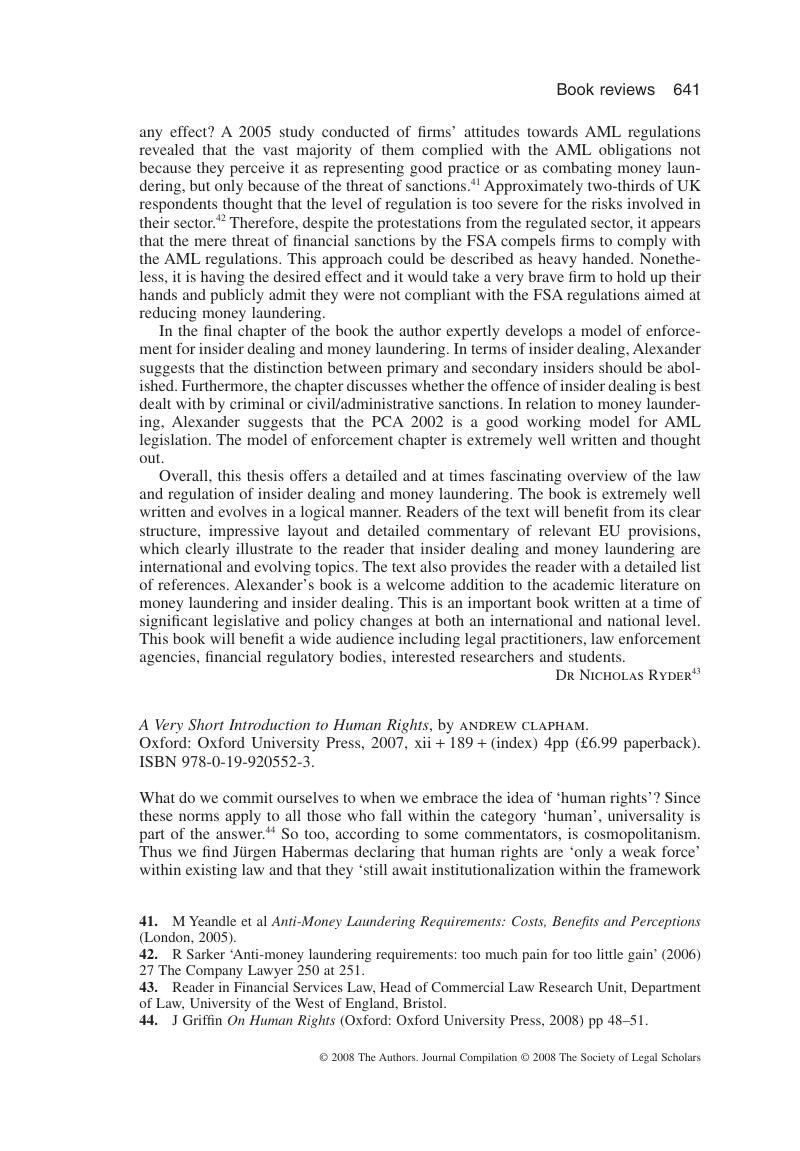Published online by Cambridge University Press: 02 January 2018

44. Griffin, J On Human Rights (Oxford: Oxford University Press, 2008) ) pp 48–51.CrossRefGoogle Scholar
45. Habermas, J The Inclusion of the Other: Studies in Political Theory (Cambridge: Polity Press, 1999) p 192.Google Scholar
46. On cosmopolitanism and cultural diversity, see Caney, S Justice Beyond Borders: A Global Political Theory (Oxford: Oxford University Press, 2005) pp 273–274 CrossRefGoogle Scholar. See also ) ch 10 (on ‘the liberal duty to recognise cultures’). Cf and pp 119–120 (talking the language of cosmopolitanism, yet placing heavy emphasis on individuals (and their interests) rather than states, nations, peoples or cultures).
47. Habermas, above n 45, p 178, et seq. See also Ignatieff, M Human rights as politics’ in Gutmann, A (ed) Human Rights as Politics and Idolatry (Princeton: Princeton University Press, 2001) pp 5–6 Google Scholar and (on Kant's legacy) and ch 6.
48. This war aim stands in sharp contrast with those of the Nazis. See Mazower, M Hitler's Empire: Nazi Rule in Occupied Germany (London: Allen Lane, 2008) p 7 Google Scholar (noting that ‘[Hitler] completely ignored calls to proclaim a European programme that could compete with the Allies’ Atlantic Charter' on the ground that the ‘New Order’ being established in Europe ‘existed fundamentally to serve the interests of Greater Germany’).
49. Bobbitt, P The Shield of Achilles: War, Peace and the Course of History (London: Penguin Books, 2003 Google Scholar) ch 14.
50. Ibid, pp 400 and 407.
51. Ibid, p 396.
52. Ibid, p 405.
53. Ferguson, N War of the World: History's Age of Hatred (London: Allen Lane, 2006) pp 166–167 Google Scholar. See also Mazower, above n 48, p 39 (noting that, in the 1920s, ‘the Soviet Izvestia gleefully described Europe under the League [of Nations] as “a prison for minority peoples”’).
54. Bobbitt, above n 49, pp 360 and 362. (The assumption shared by Wilson and Roosevelt found expression in a letter written by Thomas Jefferson in 1802. Jefferson declared that ‘it is impossible not to be sensible that we are acting for all mankind; that circumstances denied to others but indulged [sic] to us have imposed on us the duty of proving what is the degree of freedom and self-government in which a society may venture to leave its individual members’. See Hunt, L Inventing Human Rights: A History (New York: W Norton & Company, 2007) p 68 Google Scholar (emphasis added). Six decades later (and in the midst of the American Civil War), Abraham Lincoln described freedom as secured by the US Constitution as ‘the last best hope of the earth’. See (emphasis added).)
55. Hegel, Gwf (AW Wood (ed)) The Philosophy of Right (Cambridge: Cambridge University Press, 1991) ss 341–360.Google Scholar
56. Hegel, Gwf (J Sibtree (ed)) The Philosophy of History (Amehurst, New York: Prometheus Books, 1991) p 86.Google Scholar
57. Emmott, B Rivals: How the Power Struggle Between China, India and Japan Will Shape Our Next Decade (London: Allen Lane, 2008) p 2.Google Scholar
58. Ferguson, N Colossus: The Rise and Fall of the American Empire (London: Penguin Books, 2005) pp 65–66.Google Scholar
59. Ibid.
60. For a memorable assault on views such as those of Luce, see Greene, G The Quiet American (London: Vintage, 1955) pp 10 Google Scholar, 85 and 88. See also Zadie Smith's Introduction, p vii–ix.
61. Fukuyama, F The End of History and the Last Man (London: Penguin Books, 1992)Google Scholar (developing the argument outlined in F Fukuyama ‘The End of History?’The National Interest Summer 1989).
62. See Gray, J Post-Liberalism: Studies in Political Thought (London: Routledge, 1993 Google Scholar) ch 17 and (on the implausibility of the claim that the liberal political philosophy informing human rights law can bring history to an end).